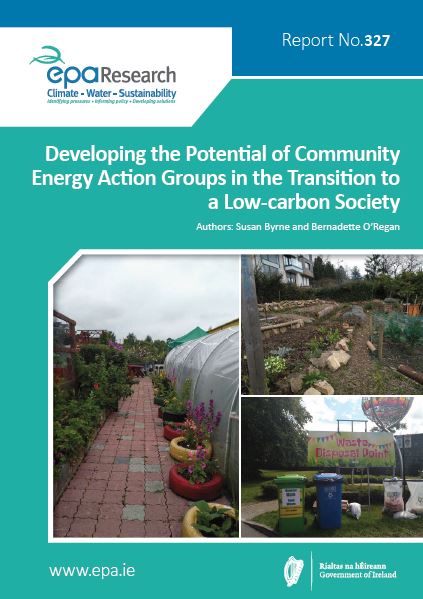
Authors: Susan Byrne and Bernadette O’Regan, July 2020
Year: 2020
In Ireland, approximately 38% of the population live in rural regions. Rural populations contribute significantly more to carbon dioxide equivalent emissions in the transport and residential energy sectors than their urban counterparts. In relation to community sustainability, this report evaluates the opportunities for rural communities in low-carbon transition in relation to energy, waste, transport and other contributing factors.

Authors: Brian Ó Gallachóir, Paul Deane, James Glynn, Fionn Rogan, July 2020
Year: 2020
The continued rise in transport activity, energy consumption and emissions can be attributed to economic, technological and societal factors. A range of technoeconomic and socioeconomic analytical tools and models were developed and employed in this project to generate an evidence base that can inform decarbonisation-focused transport sector decision-taking and policymaking.
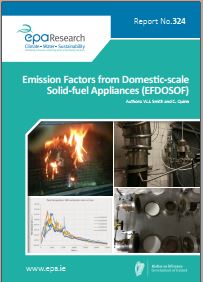
Authors: W.J. Smith and C. Quinn, July 2020
Year: 2020
The Emission Factors from Domestic-scale Solid-fuel Appliances (EFDOSOF) study set out to establish representative, real-world emission factors (EFs) for the range of solid fuels used for residential combustion in Ireland. The improved EFs developed during this study will inform and improve Ireland’s response to the UNECE Convention on Long-range Transboundary Air Pollution and to the EU National Emission Ceilings Directive.
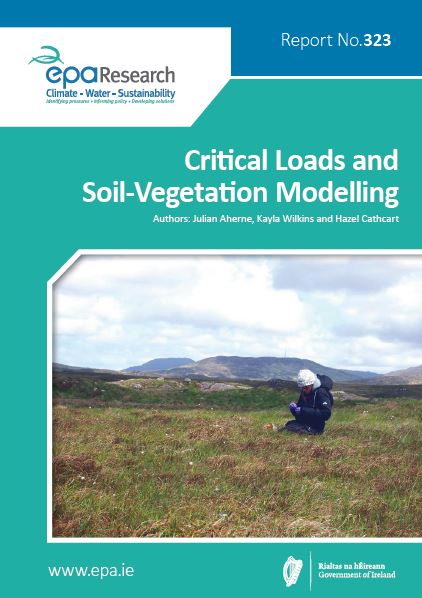
Authors: Julian Aherne, Kayla Wilkins and Hazel Cathcart, July 2020
Year: 2020
This report presents results from the research project “Critical Loads and Soil-Vegetation Modelling”. The principal objectives of this project were to update critical loads of acidity and eutrophication for terrestrial and aquatic ecosystems in Ireland, to evaluate the potential impacts of nitrogen deposition on plant species diversity.
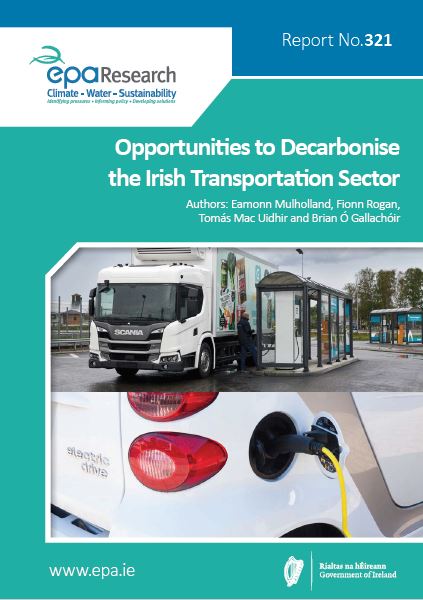
Authors: Eamonn Mulholland, Fionn Rogan, Tomás Mac Uidhir and Brian Ó Gallachóir, July 2020
Year: 2020
In 2017, the energy sector was responsible for 60% of Ireland’s greenhouse gas (GHG) emissions. The largest contributor to Ireland’s energy-related GHG emissions, at 33%, is the transport sector. A range of technoeconomic and socioeconomic analytical tools and models were developed and employed in this project to generate an evidence base that can inform decarbonisation focused transport sector decision-taking and policymaking.

Authors: Roberta Paranunzio, Barry O’Dwyer, Paul J. Alexander, Marco Guerrini, Ned Dwyer and Jeremy Gault, July 2020
Year: 2020
Globally, climate change will have wide-ranging effects on all aspects of society, the environment and the economy. This is particularly the case for urban areas, which represent only a small fraction of the Earth’s surface (less than 3%) but are where more than half of the global population resides and concentrations of assets and economic activities are found.

Authors: This report has been prepared by the EPA on behalf of the Climate Research Coordination Group, May 2020, June 2020
Year: 2020
This second report presents a summary of the Climate Research Coordination Group’s activities in 2019.

Authors: Stephen Barry and Bernadette O’Regan, April 2020
Year: 2020
Non-methane volatile organic compound (NMVOC) emissions from Solvent and Other Product Use have been estimated for 2006–2012. This included updating the activity data, emission factors and emissions data and compiling this information into a national emissions estimate for the specified years.

Authors: Laura Devaney, Diarmuid Torney, Pat Brereton and Martha Coleman, April 2020
Year: 2020
The Irish Citizens’ Assembly afforded 99 citizens the time, space and structure to deliberate on some of the most important issues facing Irish society and politics. The 13 climate recommendations agreed on by the citizens in consideration of “How the State can make Ireland a leader in tackling climate change” were significantly more radical than many expected. They encompassed a suite of sectors, solutions and policy actions.
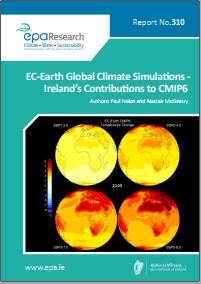
Authors: Paul Nolan and Alastair McKinstry , March 2020
Year: 2020
This report provides an overview of future global climate projections as simulated by the EC-Earth Earth system model. The global climate simulations described in this report constitute Ireland’s contribution to the Coupled Model Intercomparison Project (CMIP) (phase 6) (CMIP6) and will be included for assessment in the United Nations Intergovernmental Panel on Climate Change (IPCC) Sixth Assessment Report (AR6)
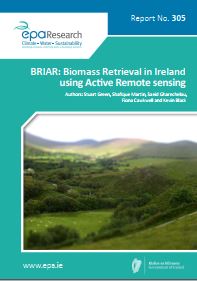
Authors: Stuart Green, Shafique Martin, Saeid Gharechelou, Fiona Cawkwell and Kevin Black, December 2019
Year: 2019
Hedgerows are an important feature of the Irish landscape. They perform multiple functions, acting as boundary markers, reservoirs of biodiversity, controlling run-off and they store carbon in above-ground biomass. The purpose of this study was to examine the use of an active remote sensing tool, imaging radar, to estimate biomass in hedgerows.
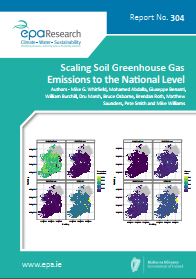
Authors: Mike G. Whitfield, Mohamed Abdalla, Giuseppe Benanti, William Burchill, Dru Marsh, Bruce Osborne, Brendan Roth, Matthew Saunders, Pete Smith and Mike Williams, December 2019
Year: 2019
This project was concerned with improving the national inventory of GHG emissions from Irish soils. The IPCC's Tier 2 and 3 methodologies were used, effectively upscaling regional data on N2O and CO2 to the national level, through a combined process-based model and geographic information system (GIS) approach.

Authors: Celine McInerney, Conor Hickey, Paul Deane, Joseph Curtin and Brian Ó Gallachóir, December 2019
Year: 2019
The European emissions reduction policy is clear and calls for the energy sectors, particularly the electricity sector, to be carbon neutral before 2050. The objective of this study is to examine how the decarbonisation of the power system will impact the investment case for both electricity generation and infrastructure assets.

Authors: Justin Doran, Thomas McDermott, Paul Kilgarriff, Swenja Surminski and Mauricio Perez Alaniz, November 2019
Year: 2019
Climate change is likely to lead to physical changes in temperature and precipitation and sea level rise, and Ireland is already experiencing the effects of climate change on its weather patterns. This project identifies several interacting factors that should be considered in designing efficient climate change adaptation strategies.
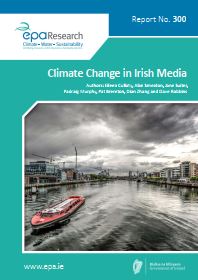
Authors: Eileen Culloty, Alan Smeaton, Jane Suiter, Padraig Murphy, Pat Brereton, Dian Zhang and Dave Robbins , November 2019
Year: 2019
Research indicates that public concern about climate change is largely derived from media consumption. This project investigated coverage trends on climate change across print, broadcast and online media in order to make recommendations for climate change communicators.
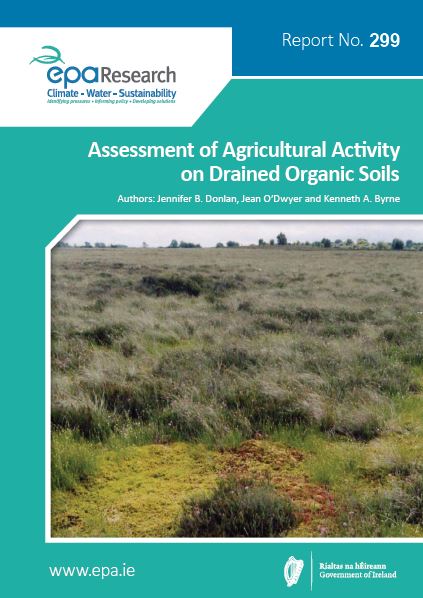
Authors: Jennifer B. Donlan, Jean O’Dwyer and Kenneth A. Byrne, November 2019
Year: 2019
Peatlands play a vital role in the carbon cycle in terms of carbon storage and biosphere–atmosphere exchange of greenhouse gases. Drainage and conversion to agriculture dramatically alters these processes and transforms the ecosystem from a carbon sink to a carbon source. A key prerequisite for assessing the magnitude of such emissions is to estimate the area of peatland under agricultural use, in this case cultivation.
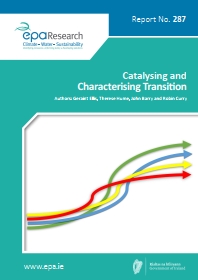
Authors: Geraint Ellis, Therese Hume, John Barry and Robin Curry, September 2019
Year: 2019
This synthesis report presents the main findings from a desk study on Catalysing and Characterising Transition (CCTransitions), which was funded by the Environmental Protection Agency (EPA).
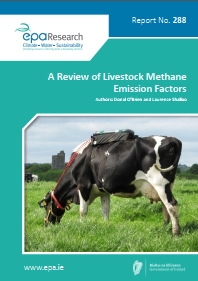
Authors: Donal O’Brien and Laurence Shalloo, September 2019
Year: 2019
Teagasc and University College Dublin, with support from the Environmental Protection Agency (EPA) inventory team, reviewed the livestock methane emission factors used in the national greenhouse gas inventory approach for the agriculture sector and assessed potential reduction strategies.

Authors: Eoin Ó Broin, Andrew Kelly, Gabriela Sousa Santos, Henrik Grythe and Luke Kelleher, September 2019
Year: 2019
The CON+AIR project presents two counterfactual scenarios for emissions and concentrations of air pollutants in Ireland in the year 2030.
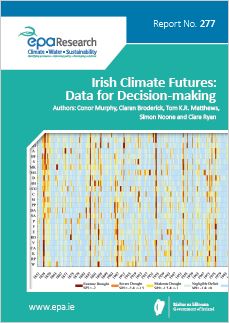
Authors: Conor Murphy, Ciaran Broderick, Tom K.R. Matthews, Simon Noone and Ciara Ryan, June 2019
Year: 2019
The realisation of a climate-resilient Ireland over the coming decades depends on decisions taken at all scales to adapt to climate change. Good decisions depend on the types and quality of information used to inform planning. Building resilience requires the diversification of the types of information used for understanding past and future climate variability and change, and a better understanding of the range of plausible changes.